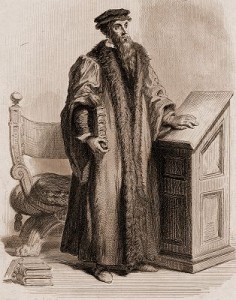In Rousseau’s dedication to Geneva, he describes the city of his birth as being the envy of the world in its equality and stability. Geneva’s virtues are numerous, including: its peaceful nature, the justness of its magistrates and the obedience of the people, as well as its small size which contributes to a general sense of community spirit. Although the real Geneva of the early 18th century was very different from Rousseau’s idealistic vision, it is possible to see how some Rousseau’s views on proper governance might of developed through an examination of Genevan history, especially of its association with Calvinism.
Since the very beginning, Genevan politics has been a mix of both secular and religious authority. During the Middle Ages, Geneva was administered by the Bishop of Geneva while the Counts (later Dukes) of Savoy appointed the Bishops (usually from its own family) and offered military protection. In 1457, an elected body of delegates known as the Grand Council was established. The Council was initially made up of 50 citizens and made political decisions on behalf of the population as well as replacing the Duke in electing new Bishops. Overtime, the Council and the Dukes of Savoy became estranged from each other and in the early 1500s, the Council tried to gain independence from the Duke of Savoy, even trying to convince the Pope to excommunicate Duke Charles III. Eventually, Geneva succeeded in breaking away from Savoy and became a republic in the Swiss Federation in 1526.
Around that time, an influx of Protestant Lutheran refugees from France began arriving in Geneva in large numbers and the new faith became popular among the people. There was considerable animosity towards the pro-Savoy Catholic clergy (who mainly came from the nobility), eventually leading the Council to declare official support for Protestantism. In 1536, every citizen of the city took a public oath to the Protestant faith.
In that same year, the French reformer John Calvin came to Geneva and was crowned the spiritual leader of the city, becoming the Pope to the city which soon became known as the Protestant Rome. Under his guidance, the Council created the Consistory, a court made up of lay elders and ministers which examined a slew of impious behaviour ranging from murder to blasphemy to dancing and playing cards. Genevan became the centre of the new Calvinist tradition, which regarded all human passions and worldly desires as sinful and punished them through severe punishments, which ranged from hanging to public flogging. By the time Rousseau was born, Geneva was no longer a democracy but a theocracy in which the clergy held tremendous sway over all aspects of civil and religious life.
This emphasis on correct behaviour and total obedience to the demands of lawmakers is clearly reflected in Rousseau’s writing. Like Calvin, Rousseau believed that everyone in a society should either accept the established law and constitution (which he describes “the declaration of the general will”) or be ejected from it, as had occurred with the systematic banishment of Catholics in Geneva. Rousseau also shared Calvin’s belief that government should have total jurisdiction over all aspects of life, including making sure that people make use of their liberty to the best of their potential. Despite not being nominally a Calvinist writer (having converted to Catholicism early in life), it is clear that the austere totalitarian theocratic structure of 18th century Geneva had a considerable influence in Rousseau’s moral development.

